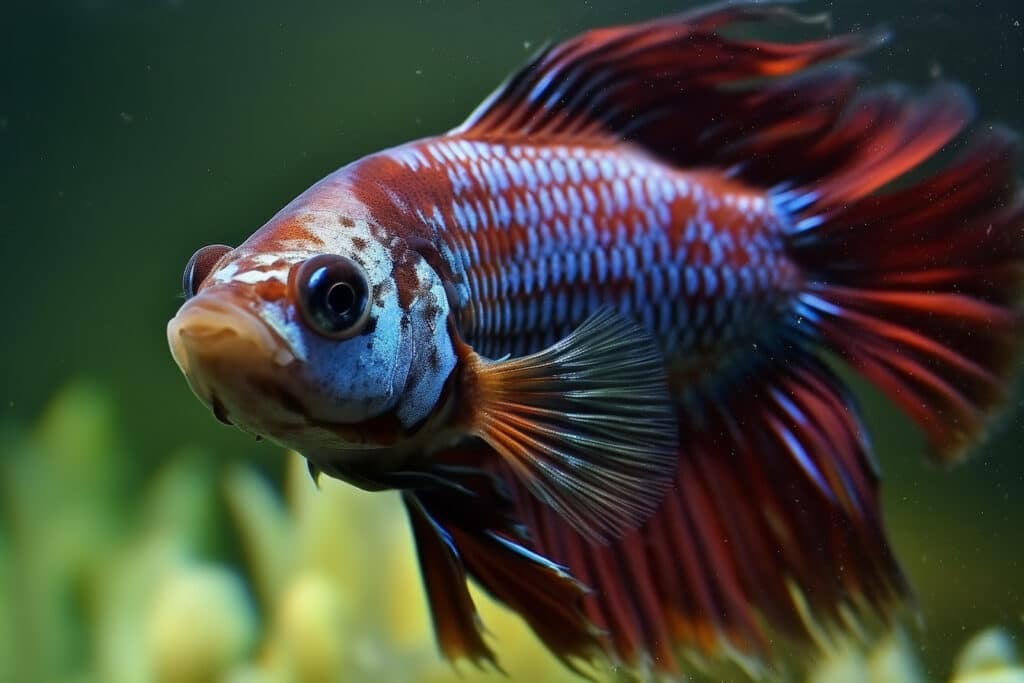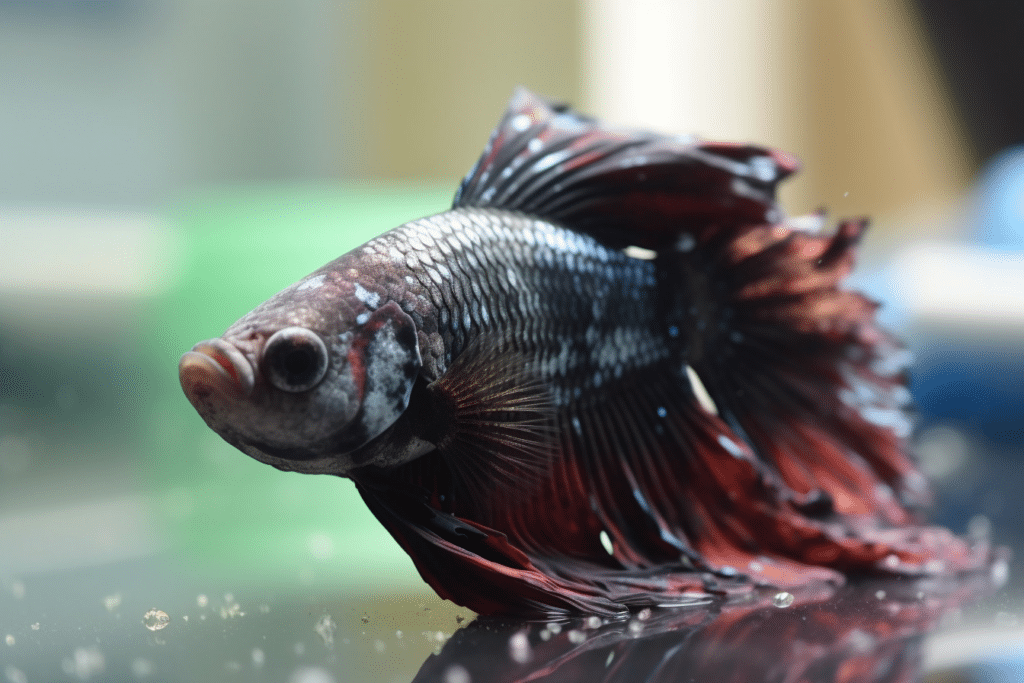Betta Fish Bloat Causes, Treatment, and Prevention Tips
Explore effective treatments and prevention strategies for Betta Fish Bloat.
Learn about the causes, signs, and how to care for your betta in this comprehensive guide. Get expert advice to keep your betta fish healthy and happy

Medical Disclaimer: The information provided in this article is for educational purposes only and is not intended to replace professional veterinary advice. Always consult with a qualified veterinarian for any health concerns or treatments related to your pet. Your veterinarian can provide diagnoses and appropriate treatment options tailored to your pet’s specific needs.
Table of Contents 🐡
So What Is Bloating Disorder
Betta fish bloat, also known as Swim bladder disorder or Dropsy is like a tummy problem. You know how sometimes we eat too much junk food, and our bellies feel all bloated? Well, it’s kinda like that for Betta fish!
They have this special organ called a swim bladder that helps them swim properly in the water, This is an internal gas-filled organ that helps the fish control its buoyancy and stay at a desired depth in the water.
Sometimes, things go a bit wonky with this organ, and their bellies get all puffy, making it hard for them to swim, causing them trouble swimming and appearing larger and rounder than normal.
Symptoms of Bloated Betta Fish
Is your Betta fish feeling a bit bloated lately? No worries, you’ve come to the right place! Spotting bloating in your aquatic buddy is the key to providing early intervention and proper care.
Keep an eye out for these 10 signs:
Swollen Belly: One of the primary indicators of bloating is a noticeably swollen or distended belly. It may appear larger than usual and can cause your Betta to look rounder than normal.
Loss of Appetite: Bloating can lead to discomfort, which often results in a loss of appetite. If you notice your Betta fish refusing to eat or displaying reduced interest in food, it could be a sign of bloating.
Lethargy and Reduced Activity: Bloat can make your Betta feel sluggish and lethargic. You might notice it spending more time at the bottom of the tank, resting on plants or decorations, rather than actively swimming around.
Difficulty Swimming: In advanced cases of bloating, your Betta may struggle to swim or maintain its balance in the water. You might observe it tilting to one side or having difficulty staying upright.
Erratic Behavior: Bloating can cause stress and discomfort for your Betta fish, leading to unusual behavior such as darting around the tank erratically or hiding more than usual.
Buoyancy Issues: Bloating can affect the buoyancy of the Betta, causing it to float upside down or have difficulty staying upright in the water.
Scales Raised: In some cases, the scales on the Betta fish’s body or belly may appear raised or “pinecone-like,” indicating fluid retention.
Reddened or Inflamed Belly: The swollen belly may appear red or inflamed, suggesting an underlying issue.
Excessive Gasping at the Surface: Bloat can cause discomfort, leading the Betta to gasp for air more frequently at the water’s surface.
Constipation: Bloating is sometimes accompanied by constipation, resulting in infrequent or strained bowel movements.
Monitoring your Betta’s health regularly and observing these signs can help you detect bloat early and seek appropriate care to ensure your fish’s well-being and happiness.
Betta Fish Bloat, Common Causes
Our finned companions may encounter this unsettling condition from time to time, but fear not!
For understanding the causes of betta fish’s bloated belly is the first step toward, effective prevention and timely intervention. In this enlightening exploration, we will unravel the common triggers that can lead to bloating in bettas:
Overfeeding: Bettas have small stomachs and can easily overeat. Uneaten food in the tank can lead to water quality issues and contribute to bloating. Feeding your betta small, frequent meals and removing any uneaten food can help prevent overfeeding.
Constipation: Bettas can become constipated if their diet consists mainly of dry pellets. To prevent constipation and bloating, include a variety of foods in their diet, such as frozen or live foods, and avoid feeding too many dry pellets.
Poor Diet: Providing a high-quality, varied diet is essential for betta health. Low-quality foods with fillers and additives may not be properly digested, leading to bloating. Opt for betta-specific foods with minimal fillers.
Swim Bladder Disorder: Swim bladder disorder can be caused by physical injury, bacterial infection, or genetic factors. It affects the fish’s ability to control buoyancy, leading to bloating and a tilted posture. Maintaining stable water conditions and avoiding sudden changes can help prevent swim bladder issues.
Internal Parasites: Internal parasites can enter a betta’s digestive system through contaminated food or water. Regularly quarantine new fish and maintain good water quality to minimize the risk of parasite infestations.
Bacterial or Fungal Infections: Poor water quality and stress can make bettas more susceptible to bacterial or fungal infections. Maintain a clean and well-maintained aquarium to reduce the risk of infections.
Water Quality: High ammonia or nitrate levels can stress bettas and weaken their immune systems, making them more prone to bloating and other health issues. Regular water changes and proper filtration are crucial for maintaining good water quality.
Underlying Health Conditions: Bloating can be a symptom of underlying health conditions, such as dropsy, which is characterized by pinecone-like scales and severe edema. Dropsy is often caused by kidney or organ failure and requires immediate veterinary attention.
By understanding and addressing these potential causes, you can better care for your betta and minimize the risk of bloating and other health problems. Regular observation and prompt action can help ensure the well-being and longevity of your beloved fish friend.
How to Treat Betta Fish Bloat
Disclaimer: The information provided in this blog post is for informational purposes only and is not intended to serve as professional veterinary advice!
If you’ve noticed that your betta fish is experiencing bloating, it’s crucial to take prompt action to ensure its well-being.
Bloat in betta fish can be uncomfortable and potentially harmful, but fear not, as there are effective treatment methods available.
In this section, we’ll guide you through various steps to treat bloat in your betta fish. From dietary adjustments and fasting to Epsom salt baths and other remedies, we’ll cover all the necessary information to help your finned companion feel better in no time. Remember, early intervention is key, so let’s dive into these valuable tips and give your betta the care it deserves!
Treating bloating in betta fish involves a systematic approach to address the underlying causes and alleviate the discomfort. Here are the essential steps to effectively treat bloat in your betta fish:
Isolating the Betta: Isolating the betta in a separate quarantine tank is crucial to prevent the spread of any potential infection or stress from tank mates and other fish species. Ensure the quarantine tank has similar water parameters as the main tank and provide hiding spots to reduce stress.
Adjusting Diet: Overfeeding is a common cause of bloating. Review your betta’s diet and ensure you’re providing high-quality betta-specific pellets with proper protein content. Avoid feeding them too many live or freeze-dried foods, which can lead to digestive issues.
Fasting: Fasting is recommended for mild cases of bloating. Refrain from feeding your betta for 24 to 48 hours to allow its digestive system to settle. Monitor your fish closely during this time to ensure it remains active and alert.
Epsom Salt Bath: An Epsom salt bath can help relieve bloating by reducing fluid retention. Prepare a separate container with aquarium water and add 1 teaspoon of Epsom salt per gallon of water. Gently place your betta in the bath for about 10-15 minutes. This treatment can be done once or twice a day for up to three days if needed.
Daphnia or Pea Treatment: Daphnia and cooked, peeled peas can act as natural laxatives for bettas. Daphnia is a tiny crustacean that bettas can consume easily, and peas can help with digestion. Offer a small amount of daphnia or a small, mashed piece of cooked pea once or twice a day until bloating improves.
Maintain Water Quality: Maintaining excellent water quality is vital for the overall health of your betta. Perform regular water changes of about 20-30% every week and use a reliable water conditioner to neutralize harmful substances. Invest in a good filtration system to remove toxins and keep the tank environment stable.
Medication: If bloating persists or worsens, consult an experienced veterinarian who specializes in fish care. They can diagnose the exact cause of bloating and prescribe suitable medications or treatments for your betta.
Always observe your betta closely during the treatment process. If there’s no improvement or if the condition worsens, seek professional veterinary advice immediately. Quick and appropriate action can significantly increase the chances of your betta’s recovery.
Bloated Betta Recovery Time
The recovery time for bloat in betta fish can vary depending on the severity of the condition and the effectiveness of the treatment provided.
In mild cases where prompt intervention is taken, bettas may show signs of improvement within a few days to a week. However, in more severe cases or if the underlying cause of bloating is complex, the recovery process may take longer, sometimes up to several weeks.
During the recovery period, it is essential to closely monitor the betta’s progress, provide proper care, and ensure the water quality is optimal. Consistent treatment and a stress-free environment are crucial for Betta’s recovery.
If there is no improvement or if the betta’s condition worsens despite proper care, seeking the advice of a qualified veterinarian is highly recommended to explore further treatment options.
Remember, every betta is unique, and recovery times can differ, so patience and attentive care are vital in aiding their healing journey.
The recovery time for bloat in betta fish can vary depending on the severity of the condition and the effectiveness of the treatment provided.
In mild cases where prompt intervention is taken, bettas may show signs of improvement within a few days to a week. However, in more severe cases or if the underlying cause of bloating is complex, the recovery process may take longer, sometimes up to several weeks.
During the recovery period, it is essential to closely monitor the betta’s progress, provide proper care, and ensure the water quality is optimal. Consistent treatment and a stress-free environment are crucial for Betta’s recovery.
If there is no improvement or if the betta’s condition worsens despite proper care, seeking the advice of a qualified veterinarian is highly recommended to explore further treatment options.
Remember, every betta is unique, and recovery times can differ, so patience and attentive care are vital in aiding their healing journey.
Preventing Bloat In Betta Fish
If you want your finned friends to live their best, bloat-free lives, you’ve come to the right place! Preventing bloat in betta fish is like setting up a VIP spa retreat for your aquatic buddies.
With a little TLC and some savvy fish-keeping tricks, you can create a serene and stress-free environment where bloating dares not tread!
Optimal Betta Tank Setup to Avoid Bloat
A minimum 5-gallon tank is advised for bettas, with larger tanks being preferable for enhanced stability and swimming room.
Adequate tank size and maintenance are crucial for betta health, helping prevent Betta Fish Bloat. Proper care ensures a thriving environment, reducing the risk of bloating and promoting a healthy life for your betta.
Aquarium Filter
For maintaining optimal water conditions and minimizing Betta Fish Bloat risk, a gentle and adjustable filter is key.
elect filters tailored for betta habitats to ensure currents are mild, avoiding stress that could contribute to health issues like bloating. Proper filtration removes toxins, supporting a safe and clean environment for your betta.
Water Conditioner
Incorporate a water conditioner to make tap water safe for your betta by neutralizing chlorine and chloramine. This step is crucial for maintaining a healthy tank environment and preventing conditions that lead to Betta Fish Bloat.
Aquarium Heater
Bettas, being tropical fish, thrive in water temperatures of 78-82°F (25-28°C). Utilize an adjustable aquarium heater to consistently maintain this range, crucial for preventing Betta Fish Bloat and ensuring overall well-being.
Additionally, equip your tank with a dependable aquarium thermometer to monitor temperature accurately, enabling precise adjustments and supporting a stable, healthy environment for your betta.
Maintain Optimal Water Quality
To safeguard your betta against conditions like Betta Fish Bloat, consistently test and manage water parameters, focusing on temperature, pH, and ammonia levels
Conduct 25-30% water changes weekly for cleanliness. Utilize a trustworthy water test kit, maintaining a pH range of 6.5 to 7.5, to provide your betta with a pristine and healthful habitat.
Provide a Balanced Diet
Bettas are carnivores and in the wild, they primarily feed on small aquatic insects, mosquito larvae, crustaceans, and other small invertebrates. They also eat algae and other plant material found in their environment.
On captive, offer a well-rounded diet to your betta fish, comprising high-quality pellets or flakes specially formulated for bettas.
Supplement their meals with occasional treats like freeze-dried or frozen foods such as bloodworms or brine shrimp. Remember, moderation is key, as overfeeding can lead to bloating and other health issues.
6 Great and Healthy Betta Food Options:
We’ll unveil the top picks for “6 Great and Healthy Betta Food Options.” Your finned friends deserve only the best, and we’ve gathered a delectable menu that ensures their optimal health and happiness
Pellets
Betta fish pellets are one of the most common and convenient food options. They come in various sizes and formulations, including floating and sinking pellets. High-quality pellets contain essential nutrients and are tailored to meet the dietary needs of betta fish.
Frozen or Live Foods
These include options like bloodworms, brine shrimp, daphnia, and blackworms. These live or frozen foods provide a nutritious and protein-rich diet that mimics the betta’s natural diet in the wild. However, they should be used as occasional treats, as they can be messy and lead to water quality issues if overfed.
Live Foods
Live food options like mosquito larvae, fruit flies, and small worms can be excellent sources of live prey for your betta fish. These live foods can stimulate your betta’s natural hunting instincts and provide them with enrichment.
Freeze-Dried Foods
Freeze-dried options like bloodworms, daphnia, and brine shrimp offer a convenient and long-lasting alternative to live or frozen foods. They retain most of the nutrients while eliminating the risk of introducing harmful parasites or diseases.
Betta Flakes
Betta flakes are another popular option, providing a balanced diet for bettas. However, they may be less preferable than pellets, as flakes can sometimes lead to overfeeding and water quality problems.
Vegetable
In addition to protein-rich foods, bettas also benefit from some plant-based offerings. Blanched peas, zucchini, or spinach can serve as occasional treats and provide additional nutrients to their diet.
Remember to vary your betta’s diet and provide a mix of these food types to ensure a well-rounded nutritional intake. Additionally, always feed in small portions to prevent overfeeding and maintain excellent water quality.
Feed Small Meals and Avoid Overfeeding
Instead of one large meal, divide your betta’s daily food intake into two or three smaller portions. This feeding schedule better mimics their natural grazing behavior and reduces the risk of overeating or bloating.
It’s easy to get carried away by your betta’s charm, but resist the temptation to shower them with excessive treats. Overfeeding is one of the primary culprits behind bloating. Monitor your betta’s appetite and adjust their portions accordingly.
Choose Suitable Tank Mates
If you plan to have tank mates, select species that are peaceful and won’t cause stress to your betta. Aggressive tank mates can lead to stress-related bloating and territorial issues.
For a betta fish with some tank mates, the minimum recommended tank size is around 10 gallons (38 liters) or more.
A larger tank provides enough space for the betta and other tank mates to swim and establish their territories, reducing the chances of aggressive behavior and stress.
Additionally, a larger tank allows for better water quality and makes it easier to maintain a stable environment for the fish. Remember, the more fish and decorations you add to the tank, the more space you’ll need to ensure everyone’s comfort and well-being.
4 cool betta fish tank mates:
Neon Tetras: Peaceful and colorful, neon tetras make great tank mates for bettas. Ensure a school of at least 6 to reduce stress.
Corydoras Catfish: These bottom-dwellers are peaceful and help keep the tank clean. Choose a smaller species to avoid bothering the betta.
Mystery Snails: Peaceful and slow-moving, mystery snails are excellent tank cleaners and won’t bother the betta.
Harlequin Rasboras: Peaceful and vibrant, harlequin rasboras thrive in groups and add beauty to a community tank with bettas.
Add Hiding Spots
Bettas appreciate some private time and areas to retreat when they feel stressed. Provide plenty of live plants, caves, and hiding spots in the aquarium to reduce anxiety and promote a sense of security.
Keep Stress Levels Low
Bettas are sensitive creatures, and stress can lead to various health problems, including bloat. Avoid sudden changes in their environment, and maintain a consistent and stable tank setup.
By implementing these preventive measures, you can significantly reduce the risk of bloating and other health issues in your beloved betta fish. Remember that regular care and attention are essential to keep your betta happy and healthy!
Inconclusion
Understanding and addressing bloated betta fish is crucial for the health and well-being of these vibrant aquatic pets. Bloating can be caused by various factors, including overfeeding, improper diet, or underlying health issues.
Being vigilant and proactive in spotting the symptoms early on can make a significant difference in the successful treatment and recovery of your betta fish.
Remember to provide them with a well-maintained tank, a balanced diet, and a stress-free environment to prevent bloating and other health problems. However, it’s important to keep in mind that while this blog post aims to provide valuable information, seeking professional advice from a veterinarian is always recommended in case of any betta illness or concerns.
Thank you for taking the time to read this blog post about betta fish bloat and how to care for these beautiful and fascinating creatures.
We hope you found the information helpful and informative. If you have any questions or would like to share your experiences with betta fish care, feel free to leave a comment below. Happy betta keeping!

Delighted to have you here at BettaReef! This place is a treasure trove of knowledge about Betta fish, Betta Care, Health, Gear, and much more from the wonders of aquatic life. My journey in this fascinating world began when I was just 8, and now, as a seasoned hobbyist, I’m here to help fellow Betta enthusiasts create a thriving Betta environment for a healthy life.
I’m committed to delivering high-quality content, backed by a stringent editorial process. Each product review is based on real-life usage and practical analysis, ensuring that you get insights and advice that truly matter.
Related Blog Posts:

Betta Fish Dropsy
Betta Fish Dropsy Best Cure and Prevention Tips! Betta Fish Dropsy, Recognize the symptoms, understand

Betta Fish Behavior Before Death
Betta Fish Behavior Before Death, Betta Fish Behavior Before Death: recognizing end-of-life signs, learn the

Betta Fin Rot: Symptoms, Causes, Prevention & Treatment
Swim To 🤿 Home Betta Fin Rot: Expert Strategies for Effective Treatment and Prevention While
